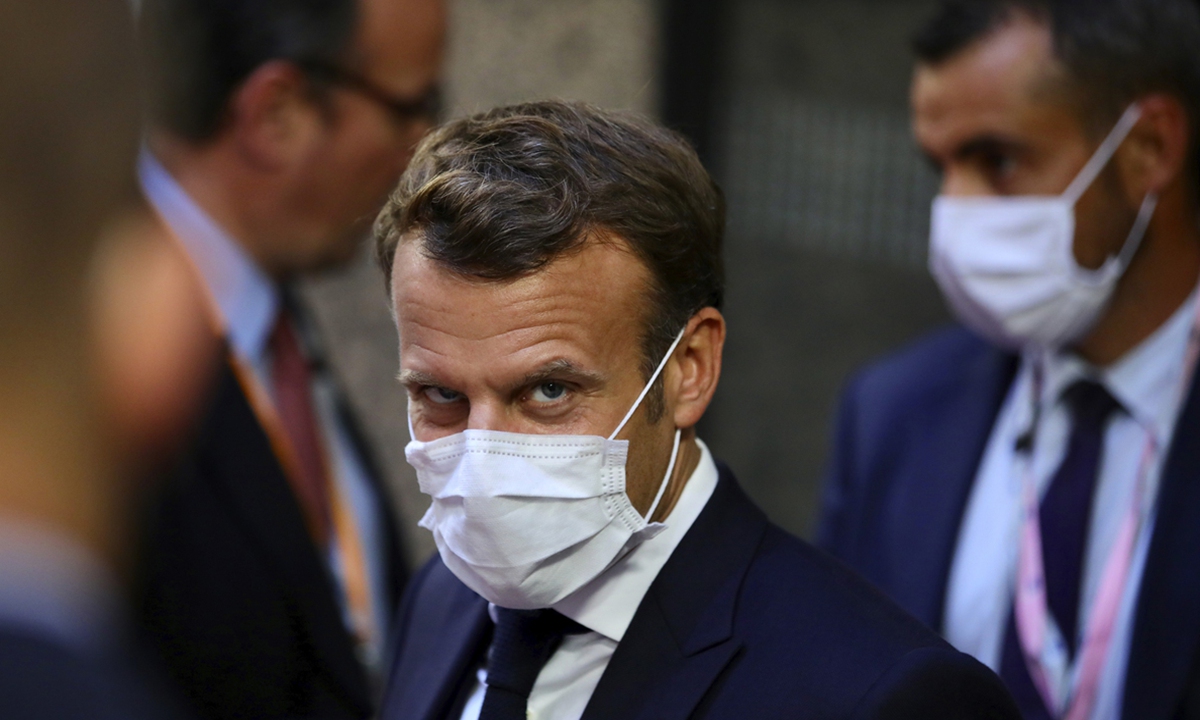
French President Emmanuel Macron Photo: AFP
To gain more diplomatic bargaining chips with "like-minded countries" in major power competition and to have more say in the Indo-Pacific region, France has taken a provocative step forward on the Taiwan question.
The inaugural Australia-France Foreign and Defense (2+2) Ministerial Consultations were held on Monday. The two countries mentioned a series of China-related issues in their joint statement, including "serious concerns about the situation in the South China Sea" and "severe human rights abuses" in Northwest China's Xinjiang Uygur Autonomous Region. Moreover, the two sides "underscored the importance of peace and stability across the Taiwan Strait" and even expressed their support for the island of Taiwan's "meaningful participation" in international organizations, according to the official website of the Australian minister for foreign affairs.
France has previously made many provocative moves on the Taiwan question. For example, in May 2020, France dismissed Chinese warnings about selling arms to the island of Taiwan, saying it was implementing existing deals and China should focus on the COVID-19 fight. In March, the French Ministry of Foreign Affairs said French senators are free to meet whoever they wish during a visit to the Taiwan island. The French Senate adopted a resolution in May to support Taiwan's participation in international organizations.
Australia, the country that has frequently followed the US to play the "Taiwan card," voiced its belligerent remarks and continued to brutally interfere in China's internal affairs. Now, France and Australia have reached a statement concerning the island of Taiwan, proactively interfering in affairs in the Indo-Pacific region.
"France was the first European country to formally adopt an Indo-Pacific Strategy. France may believe that the Indo-Pacific region will be a main battlefield of great power competition, and it is now interfering in the region to try to show its major power status. As for Australia, France regards it as a suitable country for cooperation whether in terms of ideology, values or system," Cui Hongjian, director of the Department of European Studies at the China Institute of International Studies, told the Global Times.
French President Emmanuel Macron proposed a "Paris-Delhi-Canberra axis" as early as in May 2018, a strategy he regards as a so-called key to the Indo-Pacific region. With the advancement of the US Indo-Pacific Strategy, France has also increased its investment in the region, trying to improve its international status through various diplomatic methods.
But can France's comprehensive strength support such a vision? This is a question that Macron must face. Although France has been trying to enhance its presence in the Indo-Pacific region, it is not easy to get on the Indo-Pacific chariot. After all, China and the US have greater influence compared to France, and may offset France's possible role in the region.
As a major European power, France is trying to unite Australia, regarding the "Taiwan card" as a bargaining chip in its diplomacy. This is very unwise. Lithuania acts the most radical among European countries on the Taiwan question, and China has made firm counterattacks. Although France may not act as radically, it may also try to beat around the bush on the Taiwan question.
"France must be aware how much this will affect China-French relations," Cui said.
The European Parliament's Committee on Foreign Affairs is scheduled to vote on a "Recommendation on EU-Taiwan Political Relations and Cooperation" on Wednesday and Thursday. One of the items in the recommendation was the possible renaming of the "European Economic and Trade Office" as "European Union Office in Taipei." This is a typical act of European countries trying to separate economic and trade issues from politics, which is another way of violating China's national sovereignty vis-à-vis the island of Taiwan.
Countries such as France and Australia should not misjudge the situation in island of Taiwan or underestimate Chinese mainland's determination to punish their provocative acts at any time. These countries want to gain more bargaining chips in the major power competition. But is it worthwhile by hyping the Taiwan question and being counterattacked by the Chinese mainland? They should have a sober mind.
